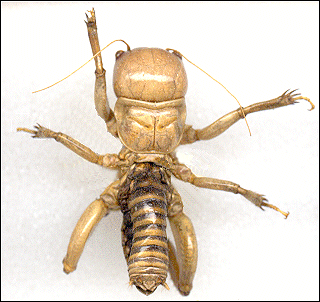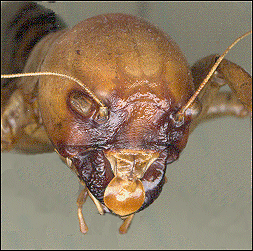
Have you ever seen an insect with a face like a child? This is our Jerusalem cricket. It also is known as "Child of the Earth," reflecting its Spanish name, niño de la tierra. Although it might look scary, it can't really hurt you, but it can bite.
Jerusalem crickets live in moist areas in the desert near streams or in
back yards. They usually stay underground, where they feed on plant roots. They are
over an inch long with large back legs and look like very fat grasshoppers. Even though
they are close relatives of the grasshopper, you can tell the difference because they
are usually yellowish-brown. If you're lucky enough to see one, pick it up by its
sides and look into its angelic face. Then you'll know why we call them
"children of the Earth".  Be sure to put it back on the ground and cover it with moist dirt,
so it can go on with its life.
Be sure to put it back on the ground and cover it with moist dirt,
so it can go on with its life.
Listen to the Audio (mp3 format) as recorded by KTEP, Public Radio for the Southwest.
Contributor: William Mackay, Laboratory for Environmental Biology, University of Texas at El Paso.
Desert Diary is a joint production of the Centennial Museum and KTEP National Public Radio at the University of Texas at El Paso.


Niño de la Tierra (Stenopelmatus sp.) as seen from the top (left) and face-view (right—perhaps not quite angelic, but certainly interesting). These images are from a preserved specimen, and the abdomen has shrunken somewhat. Note the spines on the feet that are used in digging.
Borror, D. J., and R. E. White. 1970. A Field Guide to Insects, America North of Mexico. Houghton Mifflin Co., Boston, 404 pp.